This week we pray for the Diocese of Tuam, Killala and Achonry (Church of Ireland) Bishop Patrick Rooke and for the Diocese of Bath and Wells (Church of England) Bishop Peter Maurice
Porvoo Communion grows as two Churches signed the Porvoo agreement
On September 19th the Latvian Evangelical Lutheran Church Abroad and the Lutheran Church in Great Britain signed the Porvoo Declaration, during a solemn celebration of the Eucharist, at which the Most Revd Antje Jackelén preached and the Most Revd Dr John Sentamu presided, concluding the Porvoo Communion Leadership Conference. Those who signed were Archbishop Elmars Ernsts Rozitis and Bishop Martin Lind. The two churches were welcomed as the newest members of the Porvoo Communion.
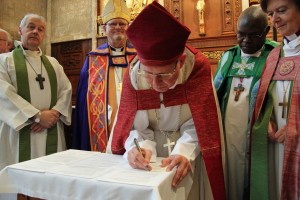
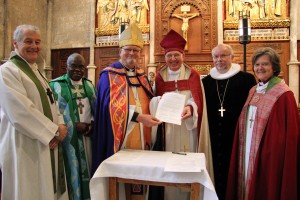
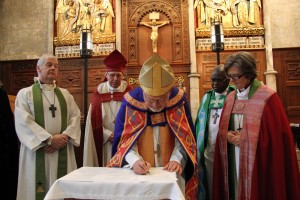
He is still lying there…
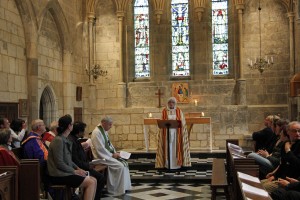
Sermon at the Porvoo Church Leaders’ Consultation 14-09-19 on Luke 10:25-37
by Archbishop Dr Antje Jackelén, Church of Sweden.
He is still lying there, after all those years. He is still lying there – no, not that particular traveler who fell in the hands of robbers on the road between Jerusalem and Jericho! He was taken care of by the legendary Good Samaritan.
But his brother, his sister, his children, they are still lying there, fallen in the hands of robbers, on the roads of the Holy Land, on the roads of Syria and Iraq, the Ukraine, Nigeria, Liberia, in the waters of the Mediterranean, and so many other places of this world. They are still lying there: women, men and children, fallen in the hands of robbers, also in well-to-do societies, stripped of clothes and dignity, left alone and half dead, or dead. And in these days, we also need to ask: who will become the Good Samaritan for the eco-systems of this planet that have fallen into the hands of robbers?
They are lying there, in sermon after sermon, pleading to us to be more fervent in our love of neighbor, to take a step or two beyond our comfort zones and show love in action, and thus become a truly diaconal church. A church that can move beyond preoccupation with differing views on homosexuality and address the scandal of human trafficking, for instance. A church that can forget the intricacies of ecclesiology for a while and move to a deeper understanding of what it means to be claimed by Christ in baptism, and gathered into God’s people to serve the world, together with people of other faiths.
Who are they, the men, women and children lying there in the roadside ditches of this world? The all seem to have the same family name. And that family name is “the other”. They are always “the other”, not us, not church officers and leaders. Not average church members, not you and I.
Because you and I, we are the priest – of course, since most of us are ordained – or the Levite. We know our dilemma all too well. On the one hand, we are busy people who work hard. We cannot possibly help all the people of the ditches in this world, not even all the beggars in our own cities. And isn’t this after all a structural problem requiring political solutions? A one-to-one strategy like that of the Good Samaritan will only perpetuate structural misery. Or so we negotiate with our conscience when it signals discomfort at the sight of a needy person.
On the other hand, we honestly bemoan the opportunities for love of neighbor that we have missed; we regret the times we chose to pass by on the other side. And maybe it is this very regret that makes us feel a little better: after all, we are not as bad as the priest in the parable, because at least, we are aware of our shortcomings. But then again, how is that feeling different from the Pharisee’s thanking God for not being like that tax collector? It is tricky to get this right!
It gets even trickier, when we ask: what really can I do? For those of us who are ordained as ministers of the Word, it is exactly words that are our foremost tool. So what did the Good Samaritan say to the man in the ditch? Nothing, it seems! According to the parable, the Samaritan did not say a single word to the victim. The text only reports on his gut reaction of pity when he saw the man’s trauma. It is to the innkeeper he speaks. The innkeeper is the one who can ensure continuous care. He is also the one in whose interest it would be to take measures for increased travel safety on the road between Jerusalem and Jericho. It would make his business more sustainable.
Words alone would not have helped. Without action the half-dead in the ditch will die. The blood of life will run out of the body, leaving it lifeless. It is the pouring of oil and wine, the bandages, the caring deed that saves life. It is word, sacrament and diakonia, as we know so well.
“It’s only words, and words are all I have …” that was the refrain in a popsong my then teenage daughter happened to play again and again while I was finishing my doctoral thesis in the late nineties. I was torn between the feeling of achievement and self-doubt: It’s only words, and words are all I have. Isn’t that too weak a tool when it comes to doing something for those who have been pushed to the ditches and margins of this world?
And yet, isn’t it with a word it all starts? In the beginning of creation, there was the word. In the beginning of creating relationship, there usually is a word, establishing the I-You relationship. In the collapse of relationship there often is lack of words. The You disappears, becomes a He or She at best, an It at worse, a Nothing at worst.
But wait a second, didn’t I complain some minutes ago that we tend to give the same family name to all the women, men and children fallen in the hands of robbers, the family name “The Other”? And yet I have done the same throughout this sermon!
That is NOT how Jesus tells the story! The lawyer wants to know “Who is my neighbor?” and probably goes away with the legally correct answer: the person in need. But Jesus twists the question around: “Which of these was a neighbor to the man who fell into the hands of robbers?” Jesus wants us to take the ditch perspective: It is not the other in the ditch, it is you and me. It is not us and our own who are this world’s Good Samaritans, it is the truly other, as truly as Samaritans were “the others” of that time.
Let us not deny our own ditch-experiences: physical or mental abuse we may have suffered from the hands of others, or self-abuse; failures or circumstances that brought collapse in relationships to others, to God, to what we own, to ourselves; bereavement and grief we could not express openly. Let us not deny the ditch-experiences of our life. As painful and devastating as they are, they are also revelatory. Because we were seen, spoken to; someone poured oil on the wounds. Otherwise we would not be here.
Who is becoming my neighbor when I am in the ditch? In that situation, I am not selective. In that situation, I will connect to anybody. I am longing for a word or wordless expression that tells me that I am seen, that my pain is noticed, and that I may hope for help.
In the end, it is help through action that counts. And yet, isn’t kindling the flame of hope that help is near the very presupposition for help being accepted, for help being effective? Only the one whose hope is somehow intact will respond effectively to the care offered.
I think that this perspective offers us some direction for our ministry, the priesthood of all believers. It is the ministry of hope that is our task, as people of faith, and as church leaders in a communion that probes ways towards greater unity and closer fellowship. The perspective of the ditches can guide us. The perspective from inside the ditches takes away the hierarchy of “we, the helpers”, and “they, the others, the needy” – or “we, the keepers of tradition” and “they, the deviators.” (Oblivious of the fact that all our theology is theologia viatorum, as the reformers put it: theology of those travelling the roads of this life.)
How can we love the Lord our God with all our heart, and with all our soul, and with all our strength, and with all our mind, and our neighbor as ourselves? The answer is quite simple: by mutually receiving neighbors and becoming neighbors, by being cared for and caring. And Jesus says, “do this and you will live.”
We believe that in the very last ditch, when life has fled our bruised body, the Good Shepherd will come close, tend to the wounds that this life has left us with, pay whatever is needed to restore us to the fullness of life and bring us to eternal joy.
Porvoo Communion Church Leaders gather in York
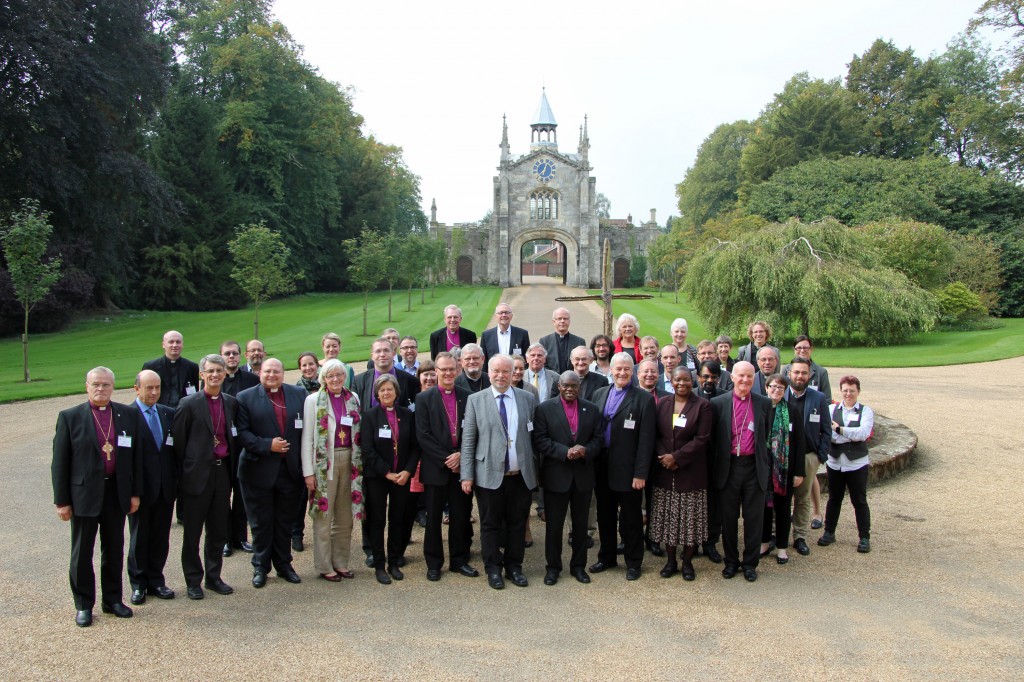
Forty-five church leaders from The Porvoo Communion of Churches met in York, UK, on 17-19 September 2014, and received the Latvian Evangelical Lutheran Church Abroad and the Lutheran Church in Great Britain as new member churches of the Porvoo Communion. The co-chairs of the Porvoo Contact Group, the Most Revd Michael Jackson and Bishop Peter Skov-Jakobsen welcomed participants and introduced the theme ‘Towards greater unity and closer fellowship’. Most of the sessions were held at Bishopthorpe Palace, office and home of the Archbishop of York, the Most Revd Dr John Sentamu, who greeted the church leaders and took part in the deliberations.
Bible studies were led by Bishop Helga Haugland Byfuglien of the Church of Norway and by Archbishop John Sentamu. The group openly shared different viewpoints, hopes and aspirations for the future of the churches and their life in communion together. The co-chairs presented introductory reflections related to the theme, which were followed by presentations from participants on communicating the gospel in today’s world; leadership as servanthood and Christian witness; religious freedom and human rights; and engaging young people in the church. The presentations focussed on the Porvoo context and led to extensive discussion and further input.
The meeting affirmed:
– The role of servanthood, leadership and discipleship in authentic Christian witness, with a special focus on the current situation in Europe
– The need to provide space and opportunities for prayer, spiritual expression and pilgrimage
– The need for a refreshed emphasis in mission as a way of life with and in the community
– The importance of including young people emphasising their visible and active role in the life of the Communion
– The important contribution of majority and minority churches in the Porvoo Communion of Churches
Based on the discussions, the church leaders agreed a work plan for the next four years.
Participants attended Evensong at York Minster each day and the meeting concluded with a solemn celebration of the Eucharist, at which the Most Revd Dr Antje Jackelén preached and the Most Revd Dr John Sentamu presided. During the celebration, the Latvian Evangelical Lutheran Church Abroad and the Lutheran Church in Great Britain signed the Porvoo Declaration. Those who signed were Archbishop Elmars Ernsts Rozitis and Bishop Martin Lind. The two churches were welcomed as the newest members of the Porvoo Communion.
Prayer Cycle Sept 14
This week we pray for the Diocese of Salisbury (Church of England) Bishop Nicholas Holtam, Bishop Graham Kings, Bishop Edward Condry, for the Diocese of St Asaph (Church in Wales) Bishop Gregory Cameron and for the Diocese of Ribe (Evangelical Lutheran Church in Denmark) Bishop Elof Westergaard
Prayer Cycle Sept 7
This week we pray for the Diocese of York (Church of England), Archbishop John Sentamu, Bishop Richard Frith, Bishop Martin Wallace and the Diocese of Espoo (Evangelical Lutheran Church in Finland) Bishop Tapio Luoma
Prayer Cycle Aug 31
This week we pray for the Diocese of Turku (Evangelical Lutheran Church in Finland), Archbishop Kari Mäkinen, Bishop Kaarlo Kalliala and for the Diocese of Edinburgh (Scottish Episcopal Church), Bishop John Armes
Prayer Cycle Aug 24
Diocese of Aarhus (Evangelical Lutheran Church in Denmark), Bishop Kjeld Holm
Prayer Cycle Aug 17
This week we pray for the Diocese of Portsmouth (Church of England) Bishop Christopher Foster and for the Diocese of Stockholm (Church of Sweden), Bishop Eva Brunne
PrayerCycle Aug 10
This week we pray for the Diocese of Bristol (Church of England) Bishop Michael Hill, Bishop Lee Rayfield and for the Diocese of Helsinki (Evangelical Lutheran Church in Finland) Bishop Irja Askola